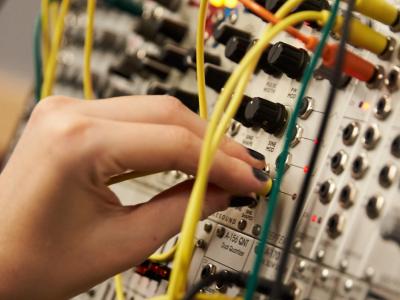What does a Sound Effects Editor (Film and TV) do?
Sound effects editors are critically important figures in the entertainment world. Without them, the sounds that accompany real life and the noises that make fantasy worlds seem real—from rustling leaves to a spaceship landing—would be missing from movies and television shows. Whether they're sourcing and modifying effects from sound effect libraries, synchronizing effects created by foley artists with the on-screen action, recording their own sounds in the field, or creating so-called designed sounds—unnatural audio that cannot be captured from real life—effects editors make visual worlds come alive.
A sound effects editor might begin a project by making a master plan that details all sounds mentioned in a script or indicated by the action, or simply be assigned certain effects to cover by a supervising sound editor. Some effects can be sourced from libraries, which are stocked with thousands of digitally stored background sounds, such as birdsong or traffic. When natural sounds that correspond with specific action visible on screen need to be recreated for a film, such as footsteps or a closing door, effects editors collaborate with foley artists. For designed sounds, effects editors create patches to modulate or manipulate existing recorded sound into the desired effect, or synthesize the sound from scratch.
At a Glance
As a variety of sound editor, film and TV effects editors might also work freelance gigs as dialogue editors or music editors—the other two primary branches of post-production sound. Those with experience in all three areas are well suited to work as re-recording mixers, balancing every element of the soundtrack for a film or show, or as supervising sound editors, leading the design, creation, modification, and implementation of all audio elements in a project.
Although the majority are freelance, sound effects editors can also be part- or full-time employees of an audio production house, movie studio, or TV production company. Beginning effects editors may gain experience and begin to build their resumes by working for little or no pay on student films, independent films, and webseries.
- Audio editing
- Basic acoustics
- Audio recording
- Audio mixing
- Sound libraries
- Avid
- Pro Tools
- DAWs
- Time management
Although there are collaborative aspects to the job, sound effects editors spend the bulk of their work days at an audio workstation with headphones on, so the ability to be alone for long stretches of time while maintaining exceptional focus and meticulous attention to detail is vital. Also important is a passion for visual media and a real feel for how sound and images work together to create compelling art and entertainment. Effects editors in particular benefit from having an adventurous and curious spirit that drives them to find new ways to (re)create sound.
Effects editors generally work different hours depending on the project they're working on and where it is in its production cycle. TV effects editing might require a few inconsistent hours each week on a long-term basis, while film effects editing could require many months of a dedicated, consistent work schedule. When deadlines are pressing, effects editors must be ready to work as much as necessary to have the assets completed in time. In between projects, freelance editors might find a week or two to catch their breath before tackling the next one.








